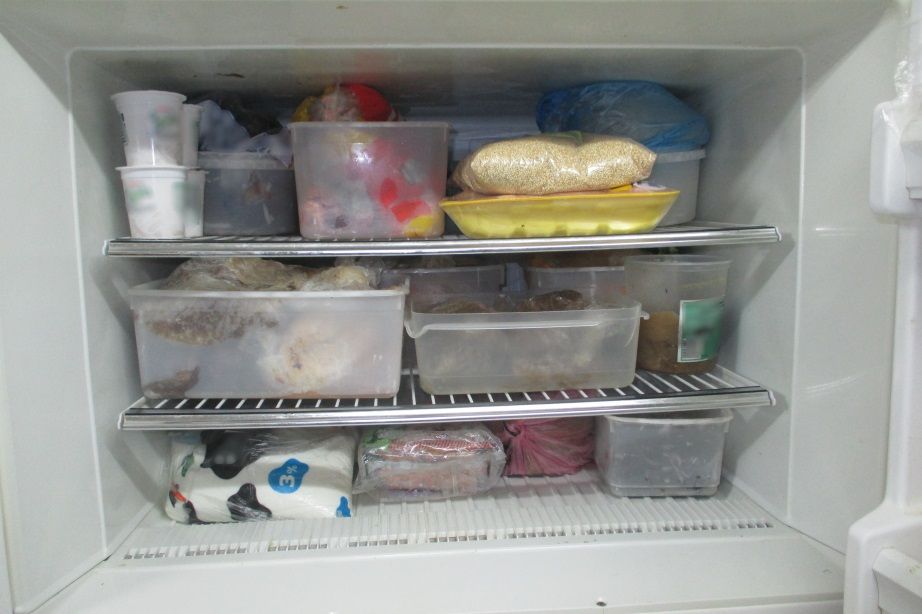 When my husband and I went away about a month ago, we came home to a non working freezer. Since then the stuff in the freezer started frosting over and then defrosting, and I needed to fix the freezer on my own. And even after that, it stopped working well, and yet again, the past few days I had things defrosting on the top shelves of my freezer.
When my husband and I went away about a month ago, we came home to a non working freezer. Since then the stuff in the freezer started frosting over and then defrosting, and I needed to fix the freezer on my own. And even after that, it stopped working well, and yet again, the past few days I had things defrosting on the top shelves of my freezer.
You have no idea how high my stress levels were. Through the roof, I tell you.
Because I was pretty sure that my fridge was slowly, slowly dying. Because why else would it stop working three times in the space of a month and a half?
I researched the costs of new fridges, and even went out to a store that sold them to check it out, and started freaking out at the disgustingly high prices I saw for a fridge similar in size to what I have now.
But before I would spend that much money on a new appliance, I figured we should invite the local appliance repair man to inspect our fridge and just give one final check before we sign the fridge’s “death certificate”.
I can breathe a huge sigh of relief, because the fridge needed only a few minor repairs, and I learned some stuff about fridge and freezer maintenance that hopefully will help prevent this problem in the future; I wanted to share it with you, so that you don’t either have these issues and need to pay a repairman. (The repairman’s fee was only 7% of what I would have paid for a new fridge like we had.)
So the first thing that needed to be done to the freezer was defrost it- water had frozen in the bottom section of our freezer, which froze the fan in place, so it was unable to circulate the cool air to make the freezer work. I’ve written about how to do that in this post. However, I knew this was by far not the only issue, since I just did this exact thing 3 times in the last month and a half. The question was why it kept on happening, what caused water to accumulate there, and why now all of a sudden and not before?
The repairman showed me that there is a drainage pipe that leads out of the bottom of the freezer and out the back of the fridge. Any water that ends up at the bottom should just drip out of the pipe instead of freezing solid, but the pipe got clogged up.
My fault.
Because of how I was keeping stuff in the freezer.
I had lots of little bags of things in the freezer. Each bag had different things in it, like veggie scraps for stock making, or broth, or whatever. Or cooked grains. Or raw grains. But lots of little tiny things.
And these bags aren’t spill proof. I’ll be honest- I often would just twist them shut, not even tying them, just tucking them inside.
And then things would spill onto the bottom of my freezer. And fall between the vent holes at the bottom. And then get into the drainage pipe.
Which was blocked.
And that’s why water accumulated instead of going down.
The repairman showed us how to remove the drainage pipe and clean it out in the sink by forcing water through it, and opening certain parts and cleaning its bends with a brush, etc…
But while knowing how to do that is certainly important, he advised me to keep all my things in containers in my freezer- no plain bags.

This’ll also help me in my organization of the freezer. I still have little bags, but I made containers for each thing- and put all the bags in those containers- one container for raw chicken and beef, one for raw fish, one for cooked fish and broth, one for cooked chicken and beef and broth, one for vegetables, one for fruit, one cooked grains, one for flour, etc… I still need to get more containers that fit my freezer better, but this is good for now.
The other thing he said is that in order to keep everything cold, you need to have enough room above and between the things in the freezer- the cold air has to blow out the vents in the back and then down in the vents in the front- if the air doesn’t have a way to get from the back vents to the front vents because the freezer is completely packed with no air “tunnels” whatsoever for it to go through, things will not get all the way frozen, and you’ll have things defrosting, and then refreezing stopping your fan from working.
(P.S. From a frugal perspective, you shouldn’t have it very empty either, since it loses the cool air every time you open it, and you use more electricity to keep an emptier freezer frozen. So find a sweet middle point- so that it’s not too empty, but not too full either that it stops circulation.
So, simple as that.
My fridge has come back to life.
And got a clean bill of health.
The repairman said mine is a very good quality fridge, and it should last us for many, many years.
So glad I didn’t need to buy a new fridge!!!
What types of things do you keep in your freezer? Do you keep things in bags or containers? Did you ever have an issue of a blocked drainage pipe like I did?
Ever thought you needed to spend a whole large amount of money to replace an appliance, and then find out that your appliance will hopefully last you for another long time?
Do you have any freezer/fridge maintenance or repair tips that you’ve learned that you want to share?
Linking up to WFMW,




